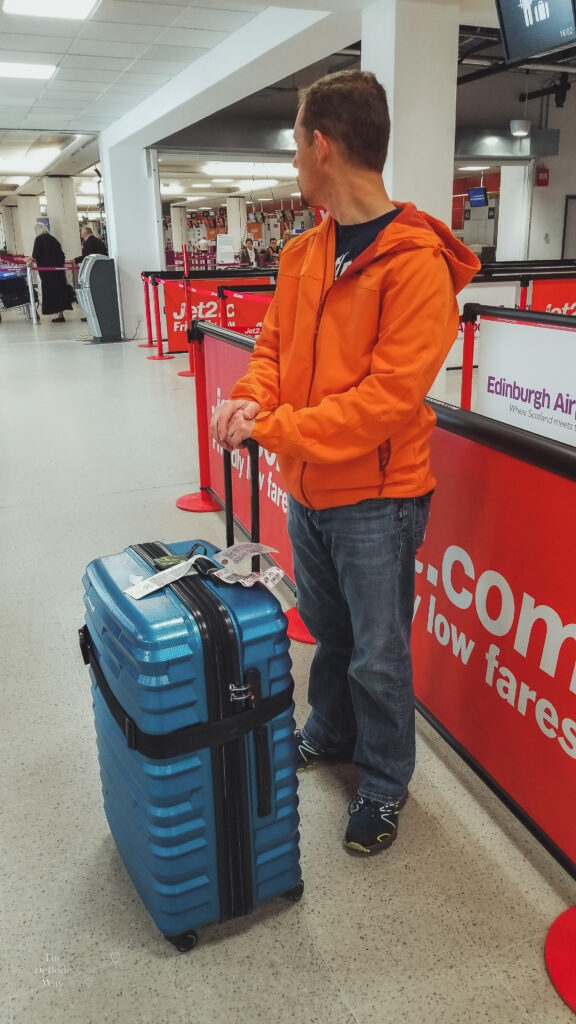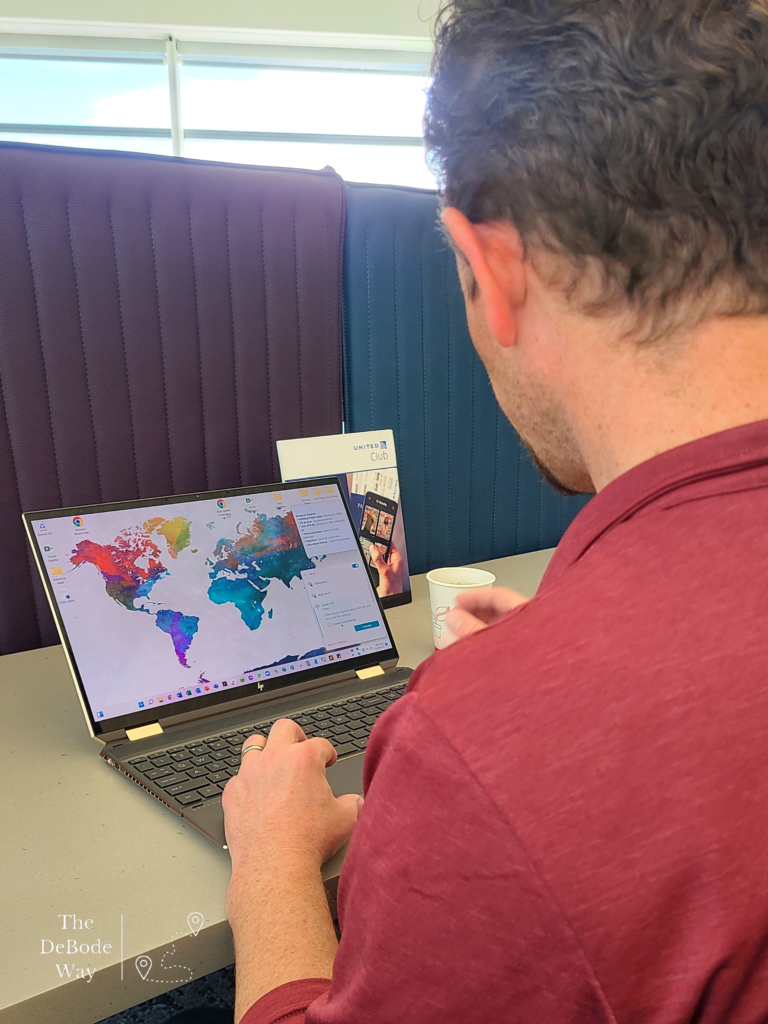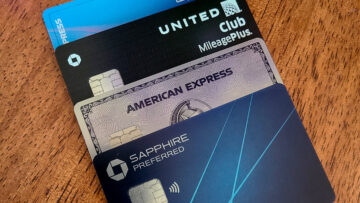This post contains credit card referral links.
We may earn points or miles based on clicks and sign-ups.
Thank you for helping us travel the world.
As I write this blog post, it’s the start of both a new month (January) and year (2023). And perhaps one of the biggest pieces of travel-related news that came at the end of 2022 was Southwest Airlines’ cancellation of more than 15,000 flights during the height of the Christmas travel season. Fortunately for us, though we did travel for Christmas it was in our car, not a plane. And even if we had flown, it’s unlikely it would have been on Southwest as they don’t fly into our local airport. Still, all these cancellations got us thinking: what’s a person to do if your flight gets cancelled? Sure, we’ve been there (and have written posts about it) and, well, it sucks. But depending on how you paid for your flight, if this happens to you, things might not be quite as bad as they seem. Hopefully, you have some level of travel insurance.
We’ve talked before about the different kinds of benefits that come with our travel-focused credit cards, and perhaps one of the most ubiquitous are travel-related insurance policies including baggage insurance, trip delay insurance, and trip cancellation insurance. Not all cards offer all of these, and for those that do, the policies can vary, so make sure you read the fine print for your specific card(s). In general, if your card includes these benefits and you pay for your flight (and other related charges, like checked baggage fees) with the same card, you might not be entirely on your own if your flight gets cancelled or your bags get lost (yep, this has also happened to us, as we’re written about in a prior post).
As you might expect, policies like these are written with a lot of fine print, so it’s important to familiarize yourself with the details of your policy before you head out on your next adventure. Let’s use our Platinum Card from American Express as an example for the following insurance policies, all of which are benefits that come with this card.

Baggage Insurance
This is probably the more common event, so let’s start with baggage insurance. We’ve flown a lot over the past few years and have only had issues with our checked bags once. So, while it does happen, we don’t want to suggest it’ll happen often, or at least it hasn’t to us. *knock on wood* Although I will say, after this incident, we adopted our “carry-on only, unless we’re headed home policy” and things have gone MUCH smoother. There’s no standing at the luggage claim wondering if you’ll see your bag again. But, if you must check your bags…
According to our AMEX policy, a few things need to happen for this policy to come into effect. First, we have to pay for the entire cost of our travel using this card. In other words, if we paid for one leg of the flight on our AMEX card and put another leg on a different card (say our Chase Sapphire Preferred card), this policy won’t work, as it explicitly says the entire trip is from your point of departure to the point of destination. Second, it needs to be a covered trip, which means your ticket was issued by the carrier and you traveled on one of their vehicles (e.g., one of their planes). Assuming those conditions have been satisfied, then covered persons (you, your spouse/domestic partner, and children under 23 years of age) are covered under the policy (again, assuming everyone’s tickets were paid for with this card).
For our policy with AMEX, if our bags are damaged or lost, we can be reimbursed for their value up to $2,000 for checked baggage and/or $3,000 for carry-on baggage, up to a total combined maximum of $3,000 per covered person. So, let’s say whatever you had in your carry-on bag was worth $3,000. In that case, if you also had a checked bag, you wouldn’t be reimbursed for its value because that would exceed your $3,000 maximum per person.
As you might expect, AMEX puts a limit on the value of certain items deemed ‘high risk items’ which includes things like jewelry, cameras, and computers, each of which have a maximum reimbursable value of $1,000. Other items aren’t covered at all, including things like travel documents, plants, pets, food, and prescription drugs. By comparison, our United Club Infinite card puts a limit of $500 on the total combined value of any lost jewelry, watches, and electronics; this is include in the $3,000 maximum reimbursement per person.
One thing to keep in mind is that you’ll have to explain the value of what was in your lost/damaged bag. That assumes you have a good idea of what was in the bag and its approximate value. If you’re anything like us, the last time our bags were lost we had no idea how to value their contents. We knew there were clothes in them, but not the exact items or their value. All that’s to say, there might be benefit in keeping a rough inventory (or just take a picture for future reference) of what you’re packing, just in case you need it later. Same goes for your carry-on bag just in case it needs to be gate-checked and something happens.
There are variations on this, too. For example, our Chase Sapphire Preferred card has a baggage delay insurance policy, which reimburses for up to $100 per day for a maximum of 5 days for essential items like toiletries and clothes. This assumes we’ve paid for our travel using this card and our bag is delayed (but not lost or damaged, necessarily) for more than 6 hours.
Trip Delay Insurance
Have you ever been on an adventure and had a delayed flight? If you’re anything like us, it might be easier to answer when you haven’t had a delayed flight! For the most part, the delays are only a few hours, which isn’t so bad if you have a credit card that gets you into a quiet lounge with food and a bar (thanks United and AMEX!). But, if your delay is longer, you might be eligible for reimbursement if your card offers trip delay insurance.
The policy for our AMEX card says that, like the baggage insurance policy, for this policy to work we have to pay for the entire trip on our AMEX card and have to experience a delay of more than 6 hours for a covered reason. If that happens, we’re able to be reimbursed for certain expenses, up to $500 per trip (note, not per person). There are two catches here, so let’s talk about each.

Covered Reasons
First, what kinds of delay-causing events are covered by our policy? AMEX lists four events that will do the job: inclement weather, terrorist action, equipment failures, or lost/stolen travel documents.
Reimbursable Expenses
So, assuming you paid for your trip with the right card and the right kind of event led to your 6+ hour delay, what kinds of things can you be reimbursed for? AMEX says ‘reasonable additional expenses’ can be reimbursed, including things like meals, lodging, toiletries, medications, and other personal items. But again, keep in mind this maxes out at $500 per trip, so don’t go crazy.
It’s worth noting that cards might vary with the maximum reimbursement amount. For example, our AMEX card says they’ll reimburse up to $500 per covered trip. By comparison, our Chase Sapphire Preferred and United Club Infinite cards have the same policy and will reimburse up to $500 per ticket.
Trip Cancellation Insurance
Technically this is called Trip Cancellation and Interruption Insurance and, according to our AMEX policy, it covers non-reimbursable expenses, up to $10,000, when our trip is either cancelled or interrupted due to a covered event. As with the other two policies, the assumption is that we’ve paid for our entire trip on this card. Let’s clarify a few things.
Cancellation v. Interruption
AMEX clarifies that a trip has been cancelled if our travel arrangements are cancelled on or before your originally scheduled departure. On the other hand, a trip has been interrupted if something happens after you’ve either left for the point of departure (e.g., you’re on the way to the airport) or you’ve already started your travel, and something happens (e.g., your second flight gets cancelled during a layover).
Covered Events
Lots of things are covered events, more than I expected if I’m being honest. These include things like bad weather, illness, jury duty, if our house is ‘made uninhabitable,’ imposed quarantines, and a few other things. Again, this might just be how AMEX defines the events, so check with your specific card for your policy’s details.
Reimbursable Expenses
If our travel is cancelled, AMEX will reimburse us for all non-refundable expenses we paid the carrier for our trip. If our trip is interrupted, AMEX will reimburse us for whatever portion of our original non-refundable travel expense that was missed due to the interruption and any additional expenses we incur to either complete our original travel or to head home.
A few things to keep in mind
As with all things, it pays to do your homework before you leave to know what is and isn’t covered by whatever insurance policies your cards have for you.
Beyond this, because you have to put the entire cost of your travel on the one card, we almost always use a single card to pay for everything for a given trip, or at least the travel. For example, we’ll put all of our travel expenses on our AMEX or Chase Sapphire Preferred card, both of which have these travel insurance policies. That way we’re sure all expenses that can be covered are on the same card. We tend not to put hotels on these cards, particularly if we’re staying at a Hilton family hotel, because we’ll use our Hilton Honors Surpass card instead, which gets us a much better benefit. We’re less concerned about getting reimbursed for hotel-related expenses, as none of our travel insurance policies cover hotel expenses anyway.
Sometimes there’s a limit to how many times in a 12-month period you can use a certain insurance policy. For example, for our AMEX card, there’s no stated limit to the baggage insurance policy, however, we’re only able to use the trip delay and trip cancellation/interruption policies twice in a 12-month period (note, this doesn’t refer to a calendar year, but a 12-month period instead; these aren’t always the same thing).
For all three of our current travel credit cards (Platinum Card by AMEX, Chase Sapphire Preferred, United Club Infinite), these are secondary insurance policies. That means we have to seek reimbursement from the airline first. After we hear from them, then we can submit a claim to our credit card under one of these policies asking to be reimbursed for whatever the airline wouldn’t cover.

In the end, having unexpected delays, interruptions, or cancelations during your travel is an unhappy experience. Unfortunately, if you travel enough, it seems likely you’ll experience at least one of these. When that happens, you can take some comfort in knowing that there is help to be found, if only to help with the expenses of making yourself comfortable during the interruption.
As a reminder, when travelling:
- Do your homework before leaving to know what insurance policies your cards offer.
- Try to put as many travel-related expenses on a single card as you can, as many cards’ policies will only cover an expense if it was made with that card.
- Know what you pack in your bags. If you don’t want to write it down, take a good picture so you can more quickly put together documentation for the value of what was in your bag if it’s lost or damaged.
Happy traveling!
You can find our referral links here.




